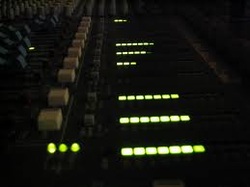
If you're into sound engineering and sees the console your place to be in a recording studio then you might want to think about enrolling in a recording school. Great audio courses are being provided in several colleges and universities and recording schools are situated everywhere. Nonetheless, there things you have to look into in relation to these programs:
1. Recording programs tend to be pricey. Each year the price of education is getting more and more costly and in order for a recording school to be at par with the rest it is necessary to invest not only in skilled educators and top of the line buildings but it also needs to buy state of the art equipment. It is not cheap. And the cost is passed onto the student, because frankly, somebody has to pay for all of it.
2. Recording courses are not detailed as you thought it would be. However, that does not imply that the information lack essential details, truth is the method of teaching is great. And it's not that they don't do their best to provide hands-on education. But at the end of the day, academic courses are theoretical, while sound engineering is concrete and real-world. There will almost certainly be gaps when you use theory-based learning to try and teach a sensible, hands-on trade. Most recording school former pupils still end up interning for little or no money at a studio, because they didn't really learn all they have to learn.
The bottom line with these two cautions is that you could virtually spend tens of thousands of dollars to master sound engineering at a recording school, and still wind up not possessing all you need for a lucrative career-because there is one thing that the best-intended conventional schools simply cannot provide:
Experience.
There are certain key things about sound engineering that can only be mastered by actually doing them. That's why in recent years, some schools (such as Recording Connection) are reverting back to an old method of instruction to fill in the gaps left by conventional recording schools: the mentor-apprentice method.
Simply put, the mentor-apprentice technique pairs students with real-life working professionals in the work environment, blending a guided curriculum with hands-on instruction. In centuries past, this approach was really the only way a trade was handed from one person to another, and it was used because it works. Recording engineers gain greatly from this type of instruction because it provides theoretical instruction, real-life experience and critical job-placement relationships-all at the same time. This education also comes at a greatly lowered cost compared to traditional schools.
Before investing a fortune on a recording school to master sound engineering you may want to consider other alternative forms of training. The best education you could have might be found at the recording studio just down the road.
1. Recording programs tend to be pricey. Each year the price of education is getting more and more costly and in order for a recording school to be at par with the rest it is necessary to invest not only in skilled educators and top of the line buildings but it also needs to buy state of the art equipment. It is not cheap. And the cost is passed onto the student, because frankly, somebody has to pay for all of it.
2. Recording courses are not detailed as you thought it would be. However, that does not imply that the information lack essential details, truth is the method of teaching is great. And it's not that they don't do their best to provide hands-on education. But at the end of the day, academic courses are theoretical, while sound engineering is concrete and real-world. There will almost certainly be gaps when you use theory-based learning to try and teach a sensible, hands-on trade. Most recording school former pupils still end up interning for little or no money at a studio, because they didn't really learn all they have to learn.
The bottom line with these two cautions is that you could virtually spend tens of thousands of dollars to master sound engineering at a recording school, and still wind up not possessing all you need for a lucrative career-because there is one thing that the best-intended conventional schools simply cannot provide:
Experience.
There are certain key things about sound engineering that can only be mastered by actually doing them. That's why in recent years, some schools (such as Recording Connection) are reverting back to an old method of instruction to fill in the gaps left by conventional recording schools: the mentor-apprentice method.
Simply put, the mentor-apprentice technique pairs students with real-life working professionals in the work environment, blending a guided curriculum with hands-on instruction. In centuries past, this approach was really the only way a trade was handed from one person to another, and it was used because it works. Recording engineers gain greatly from this type of instruction because it provides theoretical instruction, real-life experience and critical job-placement relationships-all at the same time. This education also comes at a greatly lowered cost compared to traditional schools.
Before investing a fortune on a recording school to master sound engineering you may want to consider other alternative forms of training. The best education you could have might be found at the recording studio just down the road.
This is your new blog post. Click here and start typing, or drag in elements from the top bar.
 RSS Feed
RSS Feed